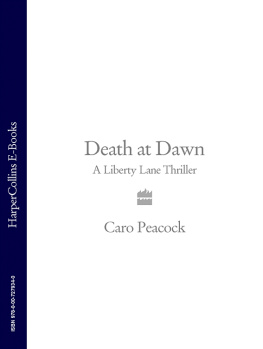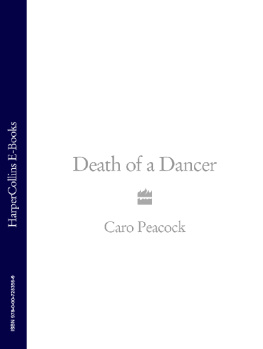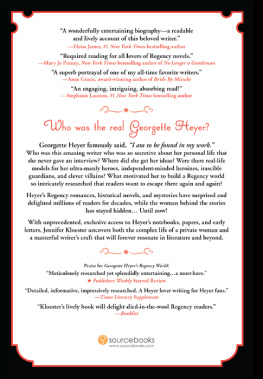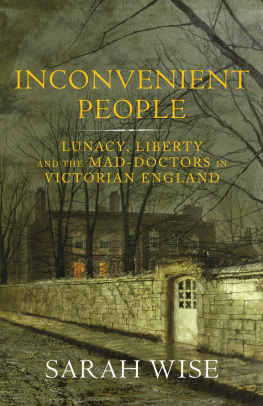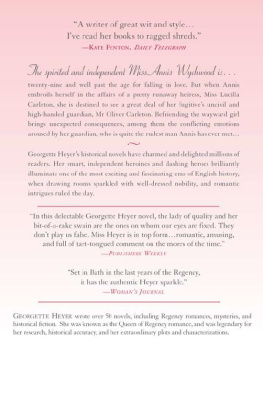This novel is entirely a work of fiction. The names, characters and incidents portrayed in it are the work of the authors imagination. Any resemblance to actual persons, living or dead, events or localities is entirely coincidental.
Harper
An imprint of HarperCollinsPublishers
7785 Fulham Palace Road, London W6 8JB
www.harpercollins.co.uk
This edition published by Harper 2010
Copyright Caro Peacock 2009
Caro Peacock asserts the moral right to be identified as the author of this work
A catalogue record for this book is available from the British Library
EPub Edition MONTH 2009 ISBN: 978-0-007-28348-4
All rights reserved. No part of this publication may be reproduced, stored in a retrieval system, or transmitted, in any form or by any means, electronic, mechanical, photocopying, recording or otherwise, without the prior written permission of the publishers.
Caro Peacock acquired the reading habit from her childhood growing up in a farmhouse. Later, she developed an interest in women in Victorian society and from this grew her character of Liberty Lane. She rides, climbs and trampolines as well as enjoying the study of wild flowers.
Visit www.AuthorTracker.com for exclusive information on your favorite HarperCollins author.
CARO PEACOCK
A Corpse in Shining
Armour


Australia
HarperCollins Publishers (Australia) Pty. Ltd.
25 Ryde Road (PO Box 321)
Pymble, NSW 2073, Australia
http://www.harpercollinsebooks.com.au
Canada
HarperCollins Canada
2 Bloor Street East - 20th Floor
Toronto, ON, M4W 1A8, Canada
http://www.harpercollinsebooks.ca
New Zealand
HarperCollinsPublishers (New Zealand) Limited
P.O. Box 1
Auckland, New Zealand
http://www.harpercollinsebooks.co.nz
United Kingdom
HarperCollins Publishers Ltd.
77-85 Fulham Palace Road
London, W6 8JB, UK
http://www.uk.harpercollinsebooks.com
United States
HarperCollins Publishers Inc.
10 East 53rd Street
New York, NY 10022
http://www.harpercollinsebooks.com
Death at Dawn
Death of a Dancer
Dry lightning flickered over the black waters of the lake, throwing the pine trees on their rocky promontories into relief against a copper sky then back into darkness, like some gigantic experiment in stage lighting. No thunder could yet be heard, but to a sensitive ear the whole atmosphere seemed to hum with the electric charge, setting nerves on edge and making repose an impossibility. The dark tower at the very edge of the water might have been designed and built to suit the humour of the coming storm. It stood at the tip of a rock ridge that stretched out from the land like the arm and claw of some great lizard of prehistoric time. Silhouetted against the pulses of lightning, the blunt column of the tower seemed as old as the rock it stood on, though it had been built five hundred years before, in a time of feud and warfare that had raged round the lake shores. Nothing in the wildness and antiquity of the scene would have told the observer that time had moved on five centuries or, to place it with precision, to the night of 26 August, 1816.
Nothing, that is, unless the observer had been daring and impudent enough to scramble up the steep rocks from the lake and peer through the window that made one narrow rectangle of lamplight in the dark bulk of the tower, to the room inside. The young woman who sat on a chair by the window, staring out at the lightning, wore a loose dress in pale silk quite in the latest style. Her travelling trunk and hat boxes piled by the wall, the writing case open on her desk, her lamp on the table, were all of the best and most modern quality. The novel that lay face-down on the table beside her was the latest production of the Author of Waverley. Although not perhaps quite in the first rank of beauty, the young woman was pleasant to the eye. Her light brown hair, let down for the night, hung over her shoulders in a shining cloak. Her hands were white and well-shaped, her features refined and regular, although her somewhat square forehead and determined chin hinted at strong opinions and a certain stubbornness.
The hypothetical observer at the window might at first glance have taken it for a picture of domestic repose. Closer observation would have revealed quite the reverse. The young woman was anxious, even perturbed. Perhaps it was the effect of the storm on a highly strung nature that made her restless. She would get up, walk a few paces round the room, pick up a pen from her writing case and put it down unused. Then she would return to her seat by the window and take up her novel, but even The Antiquary seemed unable to hold her for more than half a page. She ran a hand idly through her hair then withdrew it as if stung by the tiny crackle of electricity that the contact generated. Several times she sighed. Once she said softly to the empty room: Is this what the rest of my life will be? And sighed again, as if giving herself the answer.
When the storm broke at last and rain beat down on the waters of the lake, throwing up miniature stalagmites of water back to the dark sky, it seemed to bring some relief to her restlessness, though not her sadness. She blew out her lamp and, illuminated only by lightning flashes, moved over to a day bed set against the wall, heaped with quilts and cushions. She slid off her velvet slippers and covered herself over with a quilt, as if intending to sleep only a short time. Her eyes closed. For a while there was no sound but distant thunder and the hiss of rain into the lake. The lightning ceased. Tower, rocks and fir trees sank into darkness.
Whos there?
She was suddenly awake, not knowing how long shed slept. The room was almost totally dark. She knew at once what had woken her. Heavy footsteps were coming towards her door, thudding on the stone flags of the anteroom that led from the outside of the tower. She jumped up, heart thumping, clutching the quilt to her chest with chilled hands.
Is that you, Cornelius?
The door opened. A shape came in, darker than the darkness of the room.
Cornelius?
No answer. The darkness came towards her.
London. June 1839
At one end of the lists the Knight of the Green Tree was fighting to control his horse, a raw-boned chestnut hunter of sixteen hands or so, over-bitted and nervous of the flags fluttering in the breeze. The knights helmet was too big for him, threatening to tip down over his eyes, but with the reins and shield in one gauntleted hand and a lance in the other, he couldnt do anything about it. At the other end of the lists his opponent waited patiently on a wall-eyed roan that looked as if it might have done a mornings hard work pulling a brewers dray. The opponent wore no helmet, only his own thatch of hair the colour of good hay. Hed buckled a dented metal breastplate over his waistcoat, but unlike his opponent he had no arm or leg armour. His shield was plain wood. When his blue eyes caught mine he grinned like a schoolboy.
Are you ready, gentlemen?
The man in the top hat acting as marshal sounded impatient. It had taken ten minutes or so to get the chestnut facing approximately the right way, with the wooden barrier of the lists on the riders left hand.
Next page

